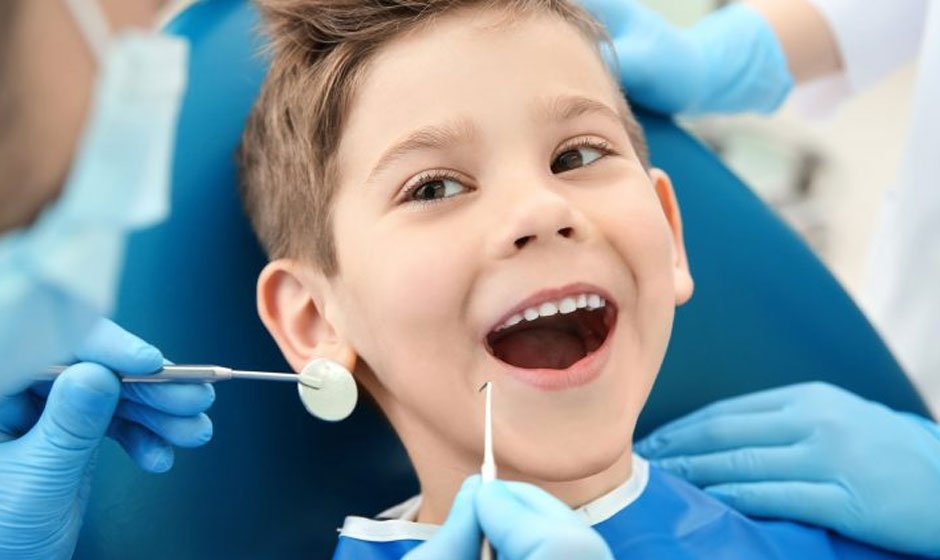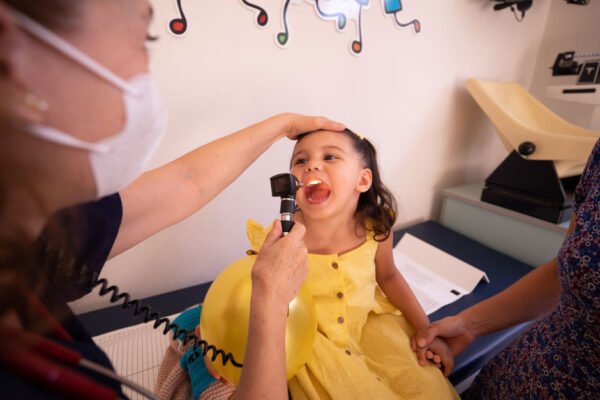A Guide to Childhood Dental Health

Introduction
In the journey of childhood development, one crucial aspect is fostering lifelong dental health habits. Prioritizing age-appropriate dental check-ups for kids is vital for steering children toward a future of healthy smiles. This guide explores the importance of childhood dental wellness, highlighting the impact of establishing strong dental habits from an early age.
Establishing Pillars of Oral Health
Role of Early Dental Check-ups
The journey to lifelong dental health commences with preventive care, and early dental check-ups are fundamental milestones along this path. These appointments transcend routine examinations, serving as crucial moments that lay the foundation for cultivating positive dental habits and guarantee the early detection of potential issues. Pediatric dentists, with their specialized training, exhibit exceptional proficiency in creating positive early experiences at EK Dental Clinic, thereby setting the stage for a child’s enduring comfort with and appreciation for dental care.
Empowering Parents Through Education
Parental involvement is integral to childhood dental wellness. These check-ups offer opportunities for parents to gain insights, seek guidance, and actively participate in their child’s dental health. This collaborative approach ensures that children receive consistent dental care at home and in the dental office, establishing a seamless continuum of oral health practices.
Monitoring Growth and Nurturing Development
Tooth Eruption and Bite Alignment
Regular dental check-ups empower pediatric dentists to monitor a child’s tooth growth and development. Tracking the eruption of primary and permanent teeth helps identify potential issues early on. Early intervention can address problems like misalignment, contributing to optimal oral health as the child grows.
Identifying Orthodontic Nuances
Certain orthodontic issues are best addressed during childhood. Regular check-ups enable dentists to identify early signs of orthodontic concerns, facilitating timely intervention and preventing more extensive treatments later in life.
Implementing Targeted Interventions
When developmental dental concerns arise, pediatric dentists have intervention strategies. These may include orthodontic treatments, habit correction, or other preventive measures tailored to the child’s specific needs. Early intervention ensures children progress with a healthy dentition.
Prevention as the Keystone of Dental Wellness
The prowess of Regular Check-ups
Prevention takes center stage in pediatric dentistry, with regular check-ups serving as a proactive strategy. Dentists assess a child’s risk for common dental issues and implement preventive measures, from fluoride treatments to dental sealants, significantly reducing the likelihood of cavities and other problems.
Professional Cleanings for Cavity Prevention
Professional cleanings during check-ups play a vital role in preventing cavities. Despite meticulous at-home care, plaque and tartar can accumulate in hard-to-reach areas. Professional cleanings maintain optimal oral hygiene, preventing cavities and promoting overall dental health.
Early Detection for Decay and Gum Disease
Regular check-ups enable the early detection of tooth decay and gum disease. Dentists can identify subtle signs that may go unnoticed, allowing for timely intervention and preserving a child’s oral health.
Crafting Positive Dental Narratives
Strategies for Overcoming Dental Anxiety
Dental anxiety is common in children, and pediatric dentists use strategies to alleviate fears. Child-friendly office designs and gentle chairside manners contribute to creating a positive and stress-free environment, fostering an atmosphere where children feel at ease during dental visits.
Building Trust for Positive Experiences
Building trust is crucial in pediatric dentistry. Pediatric dentists specialize not only in clinical expertise but also in understanding child psychology, ensuring a positive and personalized dental experience.
Pediatric Dentist’s Role in Child-Centric Oral Care
Pediatric dentists bring a specialized focus to child-centric oral care, extending beyond technical skills to include an understanding of child psychology. This approach ensures each child receives care tailored to their unique needs, fostering a positive dental experience.
Guidance and Education for Parents
Age-Appropriate Oral Care Practices
Parents receive guidance on age-appropriate oral care practices during check-ups. Pediatric dentists educate parents on adapting routines as children grow, addressing teething infants to independent brushers.
Nutritional Advice for Pediatric Oral Health
Diet plays a significant role in oral health for growing children. Pediatric dentists provide nutritional advice, guiding parents on choices that promote strong and healthy teeth and address dietary factors contributing to cavities.
Impact of Parental Involvement in Dental Habits
Parental involvement is key to a child’s oral care routine. Regular check-ups provide opportunities for parents to ask questions, seek guidance, and actively participate in their child’s dental health, fostering a sense of shared responsibility.
According to this dentist who does one of the best dental implants in Newmarket ON, parents can set a positive example by demonstrating proper brushing and flossing techniques themselves. By making oral hygiene a regular family activity, they can help children develop lifelong habits that contribute to a healthy smile. This hands-on approach, combined with consistent encouragement and supervision, empowers children to take ownership of their dental health as they grow.
Proactive Detection and Timely Intervention
Role of X-rays in Unveiling Hidden Issues
X-rays play a pivotal role in detecting hidden dental problems. Pediatric dentists use age-appropriate X-rays to assess dental development and identify potential issues beneath the surface, allowing for timely intervention.
Early Recognition of Common Issues
Regular check-ups empower dentists to educate parents about common pediatric dental issues, addressing teething challenges to thumb-sucking concerns. Early identification allows for prompt intervention.
Addressing Tooth Alignment and Bite Issues
Concerns about tooth alignment and bite issues are addressed during check-ups, exploring orthodontic options if necessary and ensuring a child’s dentition develops optimally.
Holistic Pediatric Care Through Collaboration
Pediatric Dentists in Collaborative Healthcare
Pediatric dentists play a pivotal role in collaborative healthcare for children, working seamlessly with pediatricians and specialists to address comprehensive health needs. This ensures a holistic approach to a child’s health.
Coordination for Comprehensive Pediatric Health
Coordination between dental care providers, pediatricians, and specialists is essential for holistic pediatric care. Regular check-ups provide opportunities for professionals to communicate, ensuring a child’s overall health is prioritized comprehensively.
Unified Team Approach to Holistic Pediatric Health
Taking a team approach ensures every aspect of a child’s well-being is considered. Pediatric dentists collaborate with healthcare professionals, providing a unified and comprehensive approach to addressing the health needs of young patients.
Cultivating Lifelong Oral Health Habits
Transitioning to Self-Care: Fostering Responsibility
As children grow, they transition to self-care for oral health. Pediatric dentists guide this transition, educating children about the importance of their role in maintaining healthy teeth and fostering a sense of responsibility.
Empowering Children for Lifelong Habits
Empowering children to prioritize their oral health is a central goal. Regular check-ups contribute to this empowerment by providing ongoing education, positive reinforcement, and personalized guidance, instilling the value of oral health for a lifetime.
Fostering Positivity Towards Dental Check-ups
Establishing a positive attitude toward regular dental check-ups is crucial. Pediatric dentists create an environment that fosters positivity about dental visits, contributing to a lifetime of proactive dental care.
Open Communication and Addressing Concerns
Open Dialogue for Parental Concerns
Regular check-ups provide a forum for addressing concerns and offering personalized advice and solutions. Open communication between parents and pediatric dentists builds trust, ensuring confidence in a child’s dental care.
Debunking Myths About Pediatric Dentistry
Regular check-ups allow pediatric dentists to debunk myths, providing accurate information and fostering a better understanding of the importance of pediatric dental care.
Encouraging Transparent Communication
Transparent communication is essential. Regular check-ups encourage parents to communicate openly with dental professionals about concerns, and changes in their child’s health, ensuring personalized and responsive dental care.
Conclusion
Reiterating the Crucial Role of Regular Dental Check-ups for Kids
In summary, age-appropriate dental check-ups for kids go beyond routine appointments; they are investments in a future adorned with healthy smiles. This proactive guide highlights the benefits of these check-ups, from preventive care and early intervention to empowering children with habits lasting a lifetime.
Emphasizing the Professional Guidance Needed for Pediatric Oral Health
Professional guidance is a beacon in pediatric dentistry, ensuring each child receives care tailored to their unique needs. Pediatric dentists bring clinical expertise and nuanced understanding, fostering positive and personalized dental experiences.
Encouraging a Lifelong Commitment to Dental Well-being for Every Child
As stewards of children’s health, let’s recognize the enduring impact on their oral well-being. Age-appropriate dental check-ups for kids are not just appointments; they are commitments to a lifetime of vibrant smiles. Prioritizing these check-ups instills the significance of a lifelong commitment to dental well-being, empowering the next generation with knowledge and habits for years to come.



